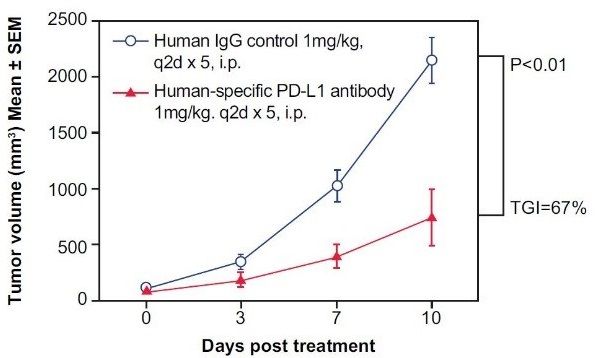Applied StemCell offers "best-in-class" custom services to evaluate the efficacy/ pharmacodynamics of your investigational antibody candidates in our functionally validated oncology mouse models:
- Repository of 100+ humanized immune checkpoint and immune gene mouse models
- Single, double and triple humanized gene knock-in
- Validated functionally with benchmark immunotherapy antibodies, in collaboration with our industry partners
- Syngeneic tumor cell lines to generate CDX tumor models
- Testing for bi-specific and tri-specific antibodies
Screen your early-stage lead antibodies using our antibody efficacy testing platform and make informed go-no-go decisions before more expensive GLP testing:
- Prioritize lead compounds
- Cost-effective evaluation of in vivo efficacy
- Fast timelines
We also offer antibody testing for other immune related disorders such as autoimmune diseases.
Workflow includes:
- Project Proposal: details on the test antibody (and positive and negative control), project design, scope of the project
- Receive antibody(ies) from client
- Tumor cell implantation and development in humanized immune checkpoint mouse models (mean tumor size reaches 100-150 mm^3)
- Administration of antibodies to humanized immune checkpoint mouse tumor models
- In vivo evaluation of antibody efficacy: tumor size and body weight, twice a week for 3-4 weeks
- Final report with data and figures
- Report will include comprehensive information about:
| Report Includes |
| experimental/project outline |
| project schedule |
| survey notes |
| raw data for efficacy parameters measured/endpoints |
| calculated/integrated results |
|
raw and integrated figures graphs and other figures corresponding to endpoint measurements Including: Tumor Volume and Body Weight |
* Endpoint: Tumor burden should not exceed 10% of the animal’s body weight. The study will be terminated with euthanizing all animals when the mean tumor volume reaches about 3000 mm^3.
Optional post-mortem tests include: Blood RT/Biochemical analysis; FACS analysis on PBMC (including CBA); serum/ plasma preparation and then ELISA, MSD or WB analysis, qPCR, WB, IHC, IF, TILs analysis
Timeline: 2-3 months after receipt of antibodies
What is antibody efficacy testing?
Cancer immunotherapy is a type of treatment for cancer that uses the patient’s own immune system to fight cancer by improving or modulating the immune system to attack cancer cells. Immunotherapy has been very successful in improving cancer survival rate in recent years either as a standalone treatment option or in combination with other types of cancer treatment.
One type of immunotherapy called Immune Checkpoint therapy targets immunoregulatory proteins called immune checkpoints (ICPs) that exert negative or positive control on T cell activity and are dysregulated in cancer to help cancer cells evade the immune system. To enable T cells to recognize cancer cells and eliminate them, monoclonal antibodies are used to block specific negative immune checkpoint proteins and have proven to be very effective in treating many different types of cancer. More recently novel immunotherapies that stimulate positive immune checkpoint proteins in order to boost T cell response and clearance of cancer cells are in development.
With the ever-increasing number of immunotherapy drugs in the pipeline, there is a critical need for predictive in vivo models that can mimic the tumor microenvironment in patients for the assessment of novel cancer immunotherapy agents and provide better translational results. Mouse models have been the most frequently used and widely accepted in vivo model for evaluating drug efficacy. But there is only a 60% homology between human and murine immune genes and antibodies that recognize humans.


